A lot changes over the course of 20 years. A chance encounter with one of our cover subjects from 2000 prompted the idea to revisit a generation that was at the forefront of the technology revolution yet has fond memories of spending summers building forts out of hay bales in their grandfather’s barn and helping out at the family’s produce stand.
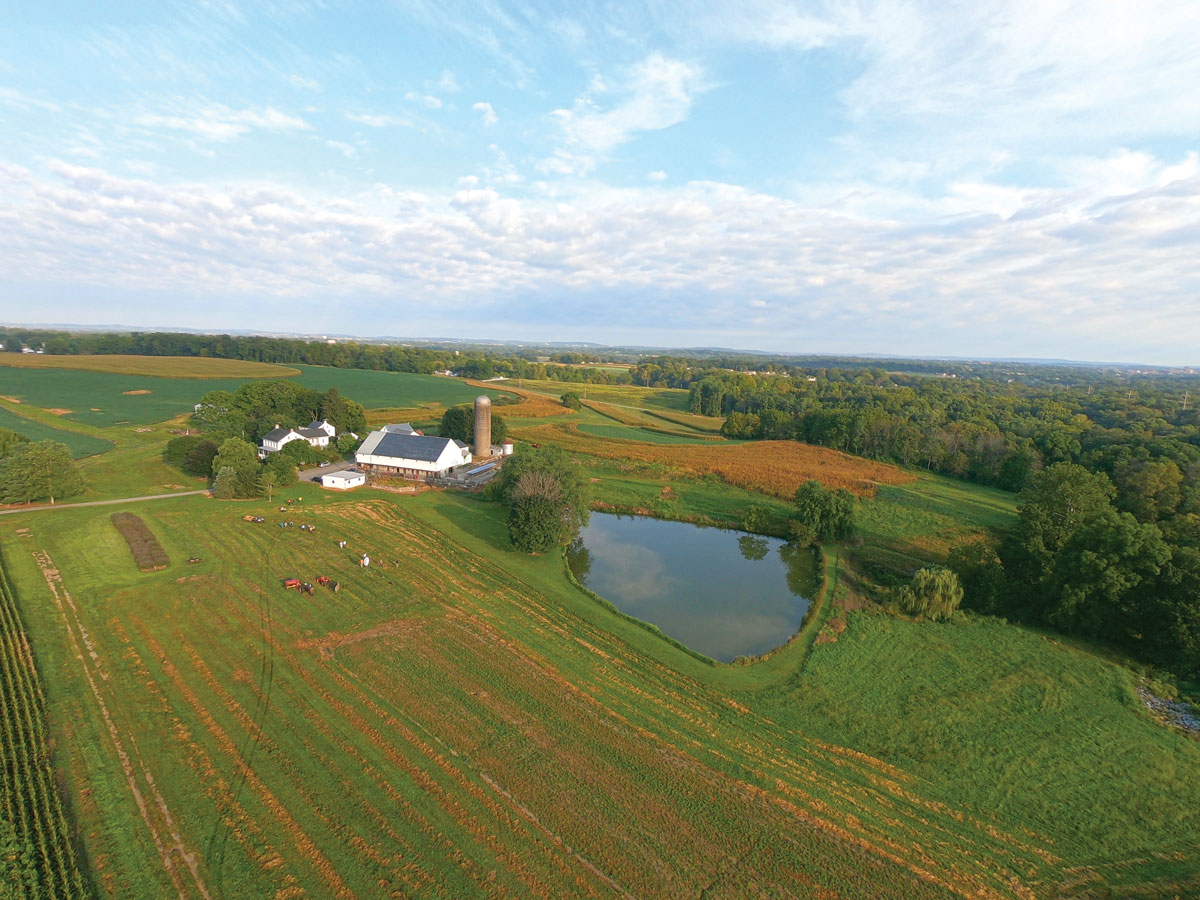
The Myers farm, which sits along Long Lane, just west of Willow Street, covers 260 acres. It is enrolled in the Clean & Green Program. The farm has been in the Myers family since 1830. Frank Myers’ grandchildren are the seventh generation to have grown up on the farm. Two great-grandchildren were born this year and account for the eighth generation to live on the farm. Photo by Kevin Voller.
Back in April, I accompanied the winner of last year’s Best of Lancaster Readers’ Survey grand prize to Nissley Vineyards, where she and her guests would be treated to a tour and wine tasting. A member of the entourage, Karen Myers, mentioned to me that she had once been on the cover of the magazine. She happened to have a copy of the photo on her phone. It recalled one of my favorite cover stories during my 30-year tenure at Lancaster County Magazine. She mentioned that she and her siblings and cousins often talked about recreating the shot.
That comment triggered an idea – so often, we do a cover story and then lose track of our subjects. I thought it would be interesting to revisit the original story and update it. So, Karen was put in charge of getting the very busy members of her generation of the Myers family together over the summer, and we would re-stage the cover photo that was taken by Allan Holm in June 2000. This time, Nick Gould would capture this generation of the Myers clan and its patriarch, Frank Myers.
Summer 2000
My travels often took me across Long Lane in Pequea Township. During the summer of 1999, I kept tabs on a large plot of sunflowers that was growing beside a roadside barn. Then, I discovered the farm’s produce stand and its famous Ambrosia corn. I also couldn’t help but notice a small field on the other side of the driveway that was ablaze with color, courtesy of a multitude of flowers. The plot was a novel idea at the time – customers were welcome to cut the flowers and create their own take-away bouquets. “We get tourists who stop and ask if they can take pictures of the place,” noted John Myers. “I guess they think it’s a quaint way to live.” I was invited to take pictures, as well, which ultimately led to the idea of doing a story about the Myers farm. We scheduled it to appear in a summer 2000 issue.
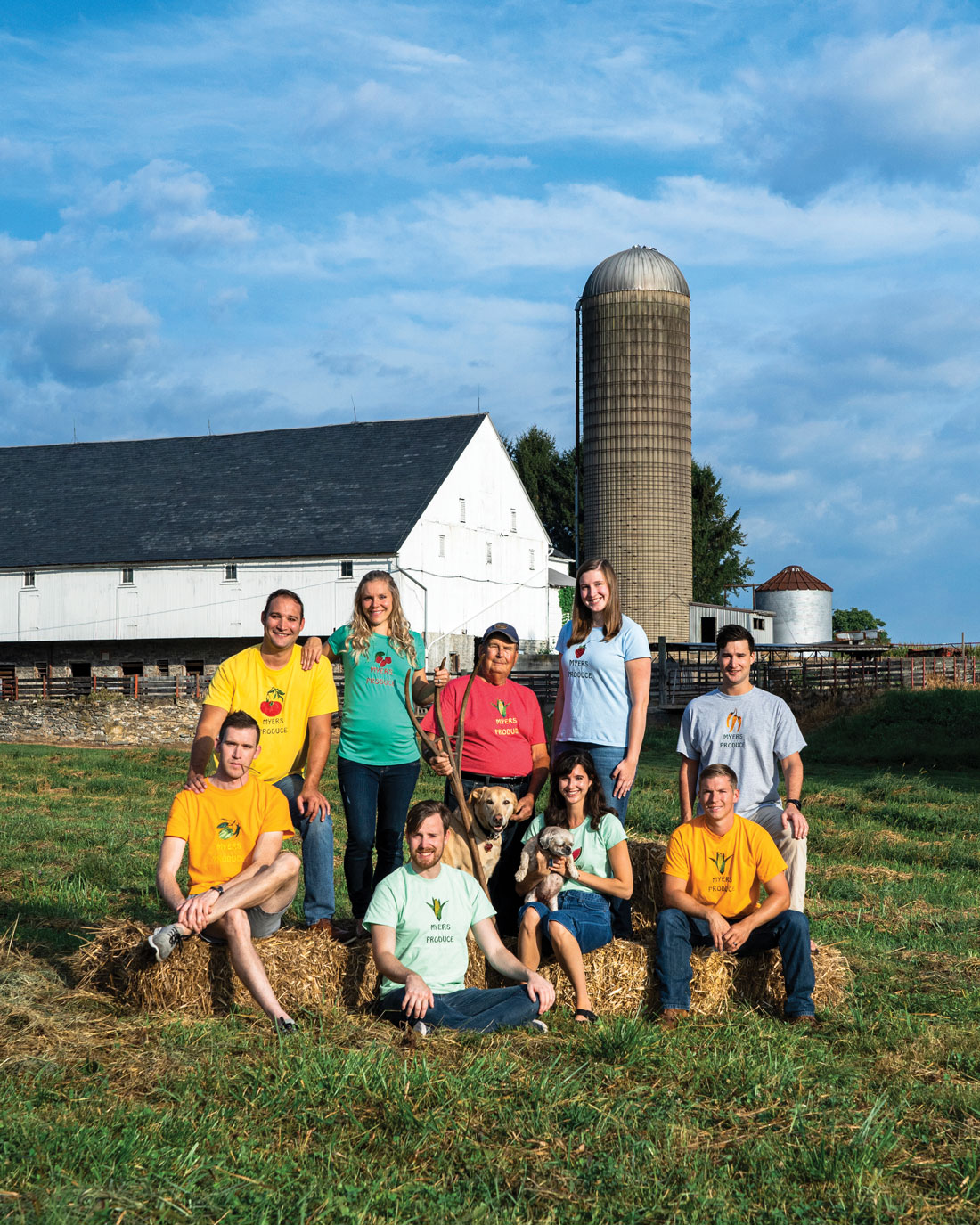
August 2019: All grown up – Frank Myers is surrounded by his grandchildren; seated left to right are John Myers, Benjamin Myers, Katharine Maisel Voller, and Bradley Myers. Standing are David Maisel, Anna Myers Bustamante, Karen Myers and Matthew Maisel. We had to change the location due to trees now blocking the original view of
the barn.
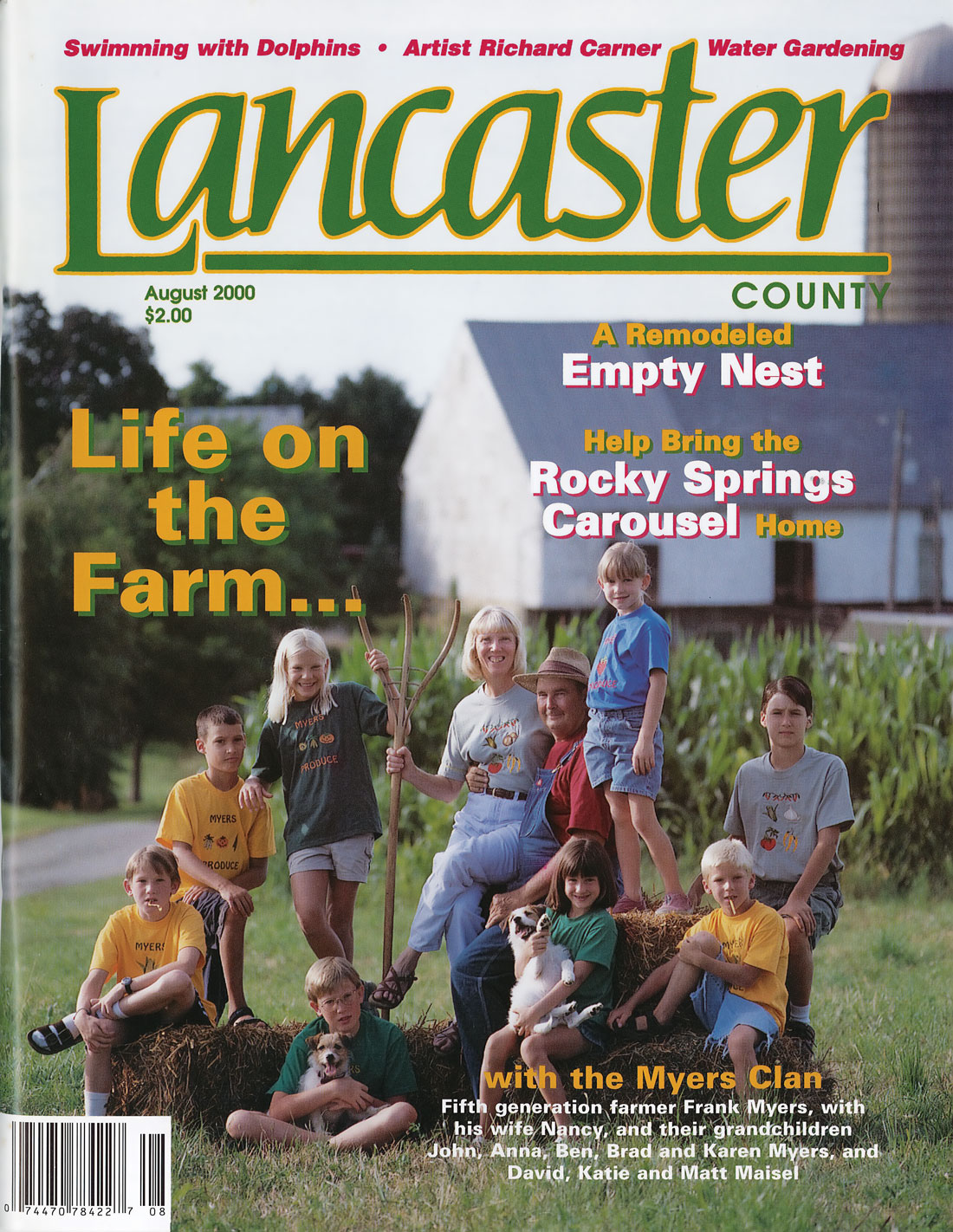
August 2000: The Myers family operated a very successful produce stand, which counted Frank and Nancy’s eight grandchildren among the helpers.
The Myers family traces its roots in America to 1710, when Hans Meier arrived from the German Palatinate and made his way to the wilderness that was the Conestoga Valley. Like many of the early settlers, Meier left his homeland to escape religious persecution. By 1830, Meier’s great-grandson, David Myers, had become the owner of a nearly 100-year-old farm in what is now Pequea Township. He is credited with building the two main barns, as well as several outbuildings that are still in use.
The farm grew in size over the years to include 260 acres. As the millennium dawned, it was home to Frank and Nancy Myers, their children, John (and his wife, Sue), Mark (and his wife, Jane) and Margie (and her husband, Greg). Eight grandchildren also called the farm home.
In 2000, life on the farm was anything but quaint or simple. Trying to get the eight grandkids and their grandparents together for one hour was a challenge. Between swim meets, Boy Scout activities, 4-H, music lessons and a week at camp – not to mention helping at the family’s produce stand – June was a busy month for the kids.
The schedules of their parents and grandparents were equally as hectic. Their days began at 5 a.m. and continued non-stop until dusk. In addition to working on and off the farm, their calendars were dotted with swim meets, church activities, camping trips, a vacation in Michigan, a Lions Club picnic and the list went on. Sue would be hosting friends from college that summer. Normally, they would head for the beach, but that year her friends thought it would be fun to live on the farm.
A sense of togetherness worked well as far as farm and family were concerned. “It takes a communal effort to keep it all going,” Frank pointed out. “Our operation is a throwback to another era, when farming wasn’t as efficient. Back then, it took more people to run a farm, simply because it was so labor-intensive. It was typical to have multiple generations of family living and working together.”
The premise of a family united also provided valuable lessons in life for the youngest generation. “They all have pets to take care of,” noted Sue of the menagerie that included dogs, cats, 4-H lambs, toads and a pig named Winky that came courtesy of a contest held during the West Lampeter Fair.
Education was also a hallmark of the Myers family. Frank and Nancy met at Penn State, where he earned a degree in agronomy and she earned one in home economics. They married in 1958. Their three children also graduated from Penn State and initially worked elsewhere – John in banking, Mark in engineering and Margie in accounting – before becoming involved with the farm on a full-time basis.
Like many modern-day farm families, their spouses divided their time between helping on the farm and pursuing careers. For example, Sue Myers, who is from Fulton County and first made John’s acquaintance at the Pennsylvania Farm Show and reconnected at Penn State, oversaw the farm’s flower operation and worked as the school nurse for the Solanco School District. Jane Myers, who has a degree in meteorology from Penn State, is a math teacher at Penn Manor High School. Greg Maisel, who served in the U.S. Navy for nine years and graduated from the University of Phoenix, is a management consultant for the energy industry.
Frank and Nancy carried their belief in the importance of education into the next generation by instituting a rewards system for their grandchildren. For working hard and earning good grades, the honorees were individually treated to a night out with their grandparents. “We don’t do anything special,” Frank explained. “We just go out and get something to eat and then maybe go to a movie over at Kendig Square.”
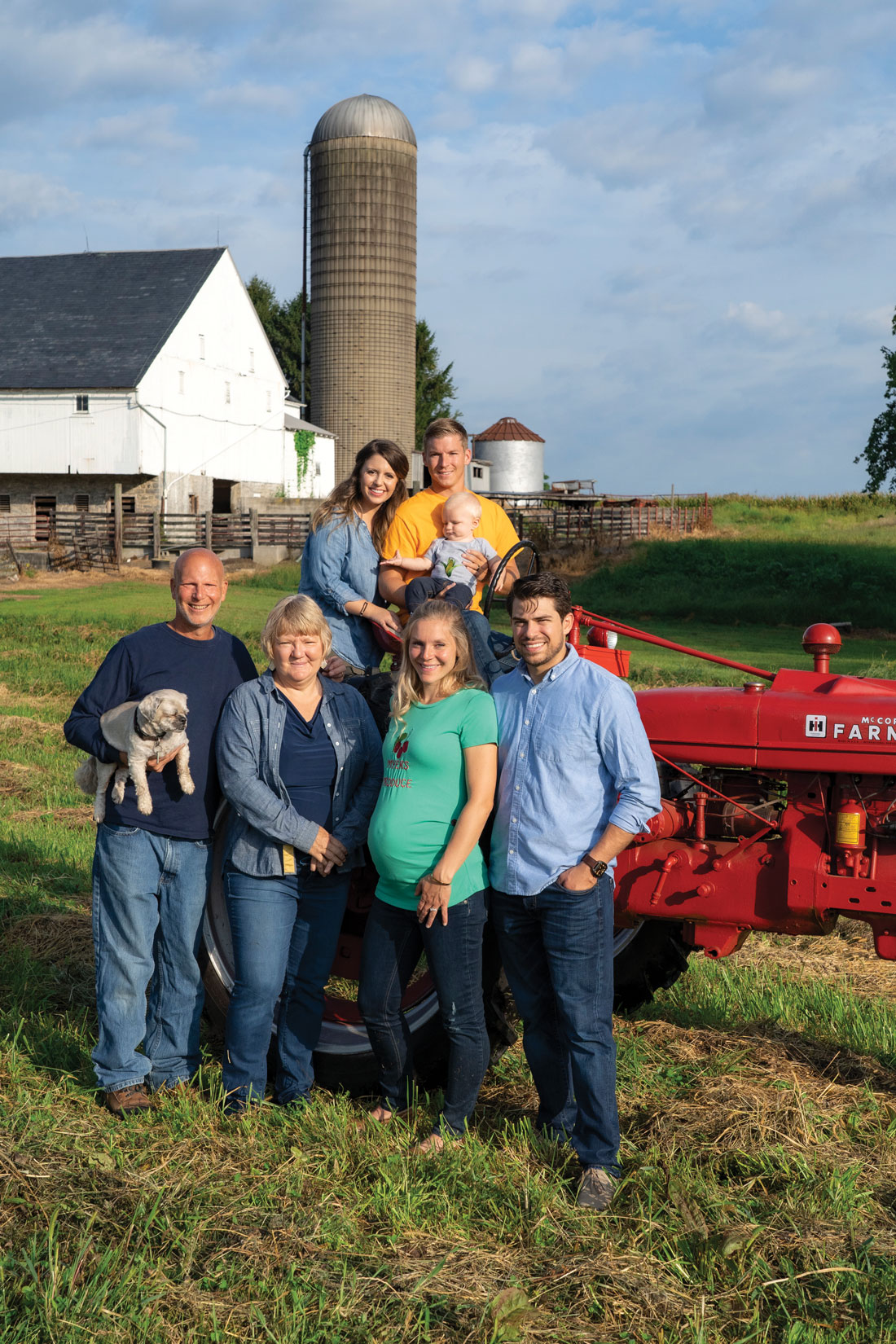
John and Sue Myers (front left) with their children, Anna Myers Bustamante and her husband, Javier (they welcomed their son, Greyson, in September), and (rear) Bradley and his wife, Jessica, and their son, Hudson.
Twenty years ago, vegetable production was a major enterprise on the farm. The farm was also home to small herds of cows and beef cattle. At the time, the farm’s claim to fame was its selection of sweet corn. Twenty acres were planted with 15 varieties of sweet corn. In 1999, the farm’s sweet corn entry at the West Lampeter Fair was declared the grand champion of the vegetable show. One variety, Ambrosia, had a huge following. “About the middle of June, we begin to get calls asking when the Ambrosia will be ready,” Sue explained. John added that Ambrosia is “our most popular variety. It’s the most sweet-tasting we’ve found. It’s good for freezing, too.” John also helped create a mania for Ambrosia by giving customers a free ear and challenging them to compare it to the variety they typically bought. The ploy worked. Customers who liked to freeze corn had standing orders for large quantities. Service organizations began buying it for fundraising corn roasts and soup sales.
The Myers established their popular produce stand in the late ’80s. The simple operation initially consisted of a wagon filled with corn. The season lasted all of three weeks. By the late ’90s, they began to notice a shift in customers’ tastes – they wanted a wider variety of fresh produce. As a result, tomatoes, melons, peppers, squash, cucumbers, eggplant, onions, beans and other items supplemented the corn. The growing popularity of decorating for the fall season enabled the produce stand to further expand.
The success of the produce stand prompted the family to begin exploring avenues that would enable them to prolong the season. They began experimenting with even more varieties of corn, keeping meticulous records that charted their performances and yields. A computer program allowed them to determine optimal dates for the 75 plantings that occurred over the growing season. Nancy even provided the human touch by starting seeds in March and moving them into greenhouses, where they could mature before being planted in the fields. “By starting early and spacing our plantings out, we’re able to stretch our season,” Frank explained of the June-to-September corn season.
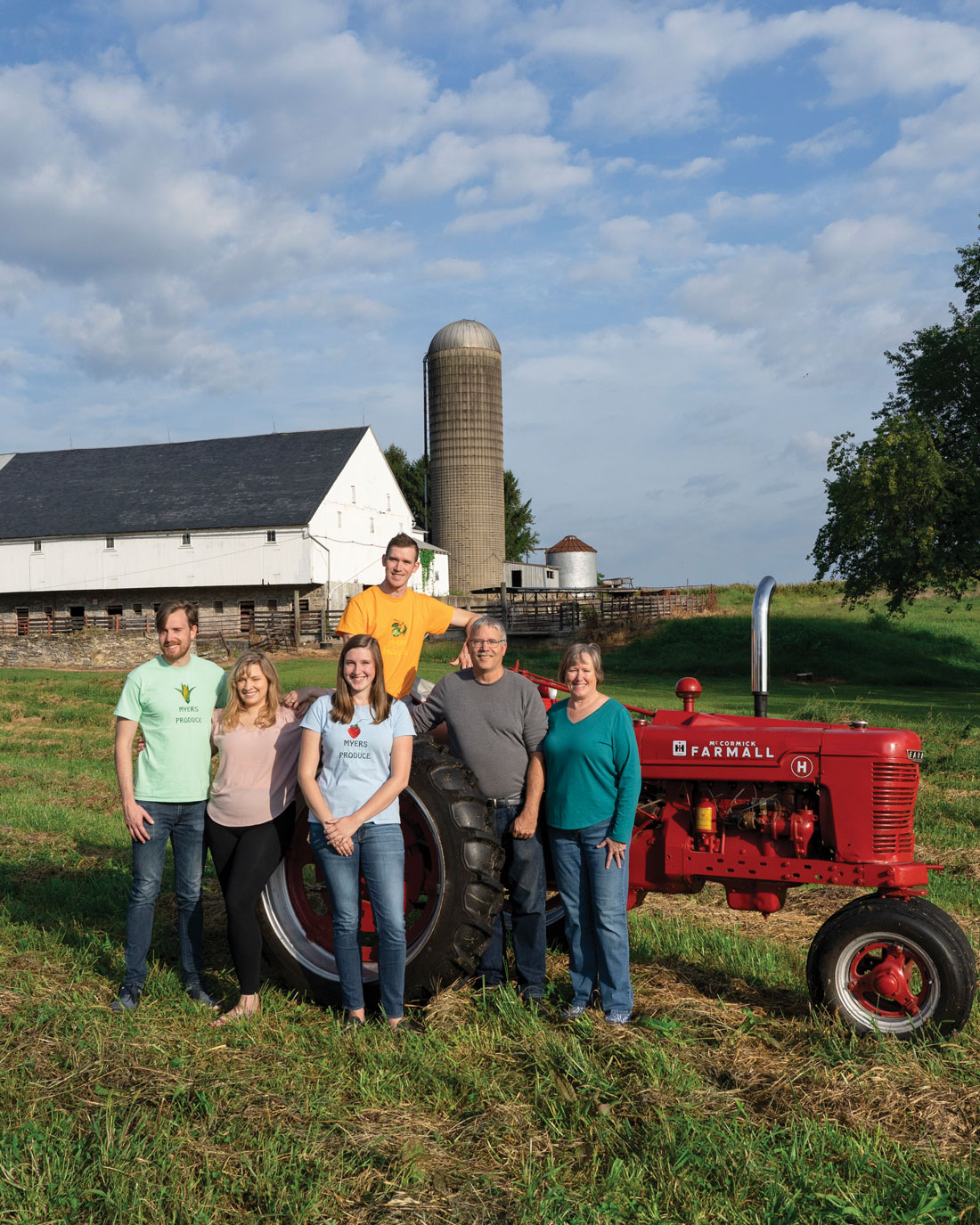
Mark and Jane Myers (right) with their children (left to right), Benjamin and his fiancée, Tara (they will be getting married this month), Karen Myers and John Myers.
The produce stand grew into a colorful – and yes, quaint – affair that attracted customers from near and far. Additional income was realized through wholesaling. The farm not only sold its excess produce through auctions, but the family began working with restaurants and grocery stores. “It’s nice to be able to work with our neighbors, and we’re not tying up a half-day or more at an auction where you’re at the mercy of a volatile market,” John explained.
The flower business materialized in much the same way. A customer asked if the flowers that decorated the produce stand were for sale and thinking they looked a little tired, Sue offered to cut some fresh ones. A business was born. A former horse pasture gained a new use, and soon Sue was supplying flowers to customers and even brides who were fans of the natural, wildflower look.
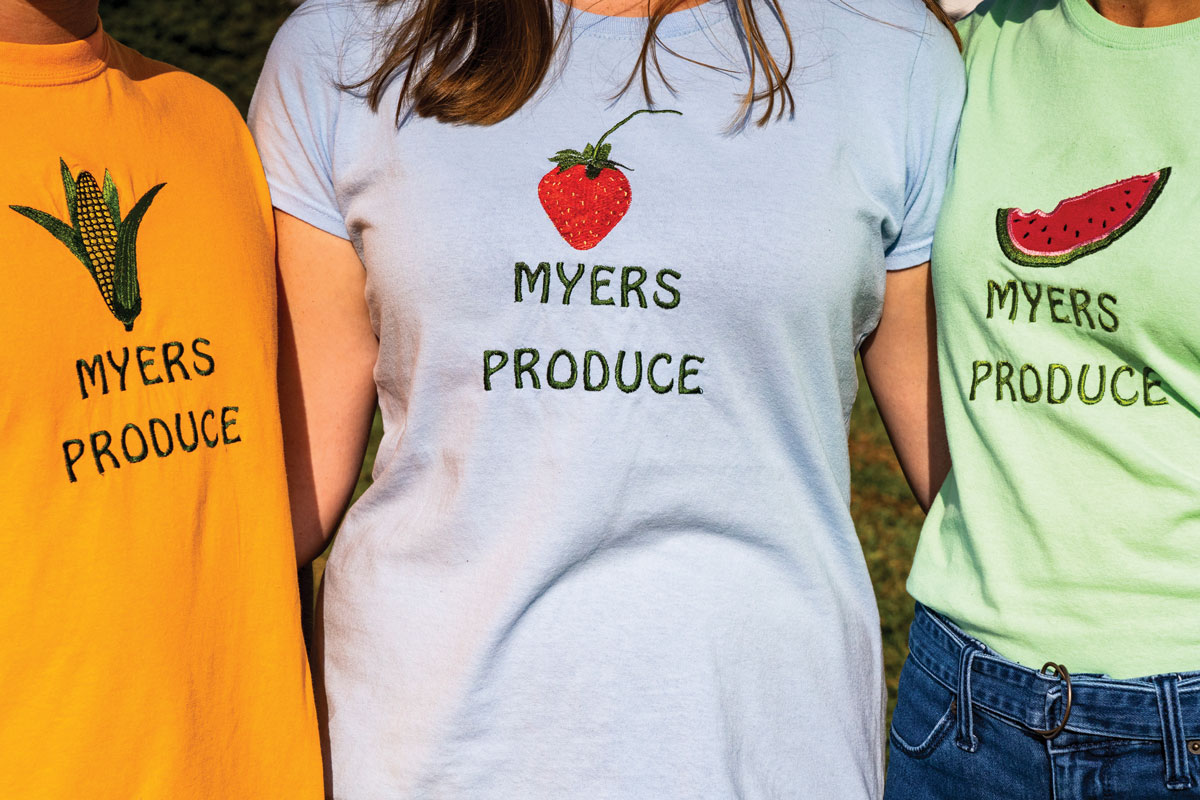
Katharine spent the summer recreating the T-shirts she and her siblings and cousins wore for the original cover. She used her grandmother’s sewing machine and patterns to create the adult-sized shirts.
But, life on the farm wasn’t all sunshine and rainbows. In the spring of 2000, a May hailstorm severely damaged unprotected plants. Later, unseasonably high temperatures wreaked havoc on plants that were being nurtured under the cover of plastic sheeting. Still, Frank was optimistic, predicting that growers would be rewarded with a “bumper crop” of corn thanks to plenty of moisture and the seasonal temperatures that followed the early heat wave.
Experience taught him to survive by rolling with the punches that Mother Nature provides. “With farming, you have to learn to deal with – and accept – the variables,” he remarked, referring to culprits such as fungus, insects and the weather. “It doesn’t help to get stressed out over things you have no control over.” But, you can fight back. He couldn’t remember a drier summer than in 1999. In order to be prepared for an encore performance, the family decided to make a capital investment and purchase more irrigation equipment. “Farming is high-risk,” John added. “But, every business venture involves some degree of risk.”
Still, the Myers family made it a point to combine work with play. During the summer, they often gathered around the swimming pool at John and Sue’s house for impromptu potluck dinners. Despite spending so much time around corn, the family never tired of eating it. “We have corn for dinner every night,” John said of his household.
In the summer of 1999, the family hired a swimming instructor to come to the farm and provide lessons for the youngest generation; children who lived in the area were welcome to join the sessions. The lessons motivated several of the children to give competitive swimming a try through the Eden Manor Swim Team.
Camping was another activity the family enjoyed. Because it was difficult to leave the farm during the growing season, they opted to develop a campsite on the farm. Boy Scout and youth groups often used the campsite, as well.
Holidays also provided opportunities for family get-togethers. “One Christmas, we had a progressive dinner,” Sue recalled. “Otherwise, we all just gather at somebody’s house. Everybody brings something.” For Halloween, children from local scout troops, youth groups and schools were invited to the farm for hayrides. For the Fourth of July holiday, the family would gather with friends atop a hill on the farm to watch fireworks.
Volunteerism was another tenant of the Myers family. During Farm Show Week, family members would help to man the Pennsylvania Vegetable Growers Association stand. All three sets of parents were active volunteers at Pequea Elementary. Additionally, they helped with the oyster dinner that Willow Street United Church of Christ held. The Willow Street Lions Club also counted on them to help with their turkey dinners. “Oh, we stay busy, that’s for sure,” John noted.
Summer 2019
Getting the Myers siblings and cousins together proved equally as challenging as it did in 2000. Careers and families were now keeping them busy.
John and Sue’s daughter, Anna, earned her nursing credentials from Penn State and works for Lancaster General Health/Penn Medicine. In 2013, she married Javier Bustamante, a Penn State alumnus who is an aeronautical engineer with BAE Systems. In September, Anna and Javier became first-time parents with the arrival of their son, Greyson. Anna’s brother, Bradley, who graduated from Penn College of Technology, works for Keystone Custom Homes. In 2017, he wed Jessica Andrews, who is a registered nurse at Hanover Hospital. Their son, Hudson, was born in March.
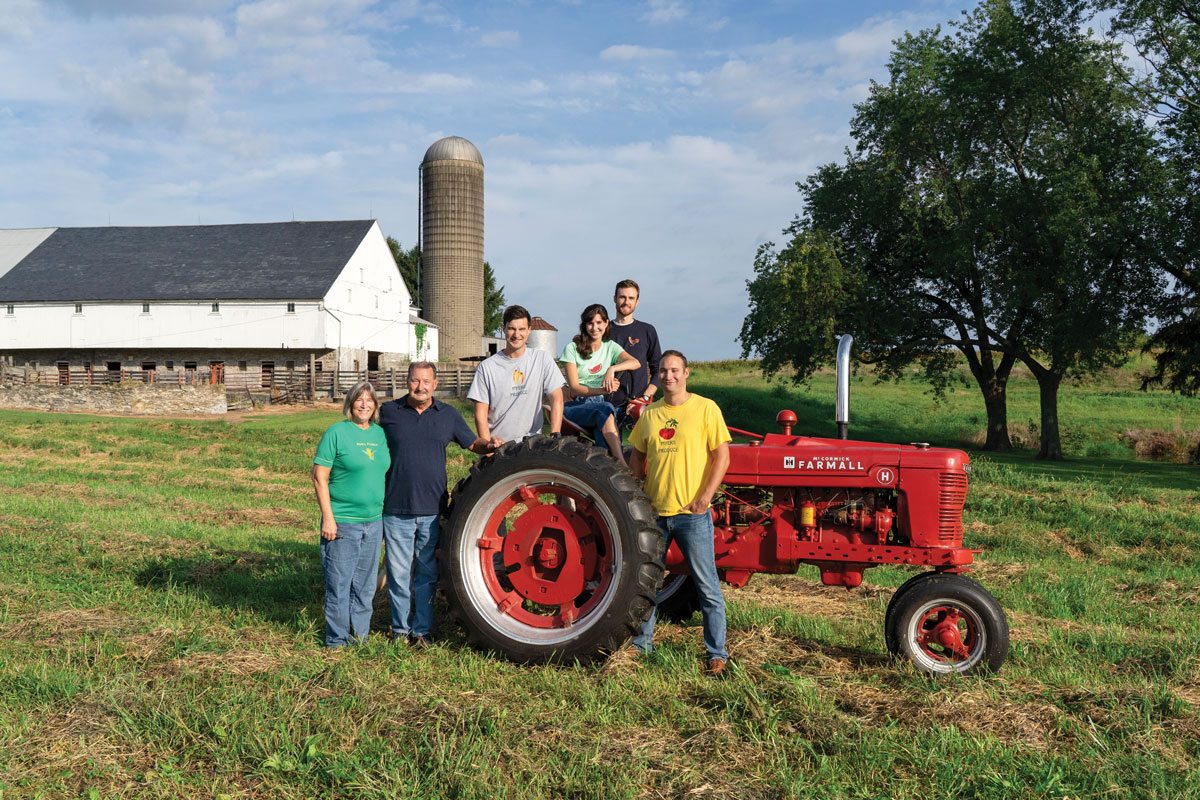
Margie and Greg Maisel (left) with their children (left to right), Matthew Maisel, Katharine Maisel Voller and her husband, Kevin, and David Maisel.
Mark and Jane’s children include Benjamin, who earned a degree in electrical engineering from Penn State and works for the Audubon Company in Wexford, Allegheny County. He will be marrying Tara Maziarz this month. Tara is the communications and community outreach manager for HEARTH, a Pittsburgh-based nonprofit that works with women and children who are survivors of domestic violence or trauma. John, who graduated from Penn State with a degree in chemical engineering, works for Monroe Energy in Delaware County. Karen, who also graduated from Penn State (food science), is a regional food safety specialist for Sunbury-based Weis Markets.
Margie and Greg’s eldest son, Matthew Maisel, earned his undergraduate degree at Penn State and completed his Masters of Computer Science at Johns Hopkins University. He works as a data scientist in technology start-up companies. In 2016, he married Rachel Criner, MD, who also earned her undergraduate degree from Penn State and her medical degree from Temple University. They recently moved to Philadelphia from Ann Arbor, Michigan, where Rachel completed her internal medicine residency at the University of Michigan. Rachel’s fellowship at the University of Pennsylvania is focused on pulmonary and critical care.
Their other son, David, who earned a degree in agricultural business management from Penn State, works for an affiliate of Four Seasons Produce. Their daughter, Katharine, graduated from Penn State with a degree in petroleum engineering and works for Range Resources in the Pittsburgh area. In 2018, she married Kevin Voller, a Penn State alumnus who double majored in information science technology and philosophy and is employed by Dick’s Sporting Goods as a software designer.
“We’re a Penn State family, that’s for sure,” says their proud grandfather. He credits the work ethic they learned as children as the reason they’ve all been able to forge successful careers.
This was a significant year for the clan – three of Frank’s eldest grandchildren turned 30 years old. Karen is the youngest at 25, with the others falling in-between. It’s said that cousins often have stronger bonds than siblings and that well may be the case with the Myers clan. “We did everything together,” Karen recalls, thinking back to the years they spent manning the produce stand, swimming in the pool, sharing their books (Harry Potter was must reading), playing in the barn, ice skating on the pond and sledding down the farm lane. They also formed a united front on the school bus. “Nobody messed with any of us,” Karen recalls. (They all graduated from Penn Manor High School.)
Sadly, a family member is missing from the new photo. Nancy Myers succumbed to ovarian cancer in October 2003. She valiantly fought the disease for two years. It was Nancy, the home-ec major in college, who designed and created the T-shirts that the family wore while working at the produce stand. Her grandchildren all wore them for the 2000 cover shot. As they would be recreating the cover shot, her granddaughter, Katharine, thought it would be appropriate to wear them again.
Katie, as she is called, retrieved Nancy’s treasured Bernina sewing machine and the patterns she had designed and set to work over the summer to create adult-sized shirts for her siblings and cousins in time for the late-August shoot. They were each delivered with a poignant note, part of which read, “Pulling out all of Grandma’s old stuff was like diving way back in time. Her machine and all the gadgets and supplies sat there for so long untouched because it was too painful to do the things that we used to do with her, without her. Even though I loved sewing, I stopped because it was the sewing with Grandma that I loved the most. Starting this up again felt odd because I still miss her. I wondered what she would be like now and would she love to see who we’ve all become.” I think the answer to that is a simple one: no doubt, she would be very proud.
“It takes a communal effort to keep it all going”
Frank misses her as well. But, he keeps busy, tending to the farm (with the help of family, including a brother and a part-time employee) and engaging in his favorite hobby, genealogy. His research is contained in two self-published books that trace the progression of the Meier/Mayer/Myers/Meyers family in Lancaster County. For years, he and Nancy helped to tend the Mayer cemetery that sits beside Whole Foods. At 84, he says – with a wink – that he is “slowing down.” Four years ago, he underwent double bypass open-heart surgery. He tries to work out at the gym three times a week. “When I have the time,” he jokes.
Frank has seen a lot of changes occur in his lifetime. “I went to school in a one-room schoolhouse,” he noted in our original interview. “I can remember when Long Lane was just a country road; most days you’d be lucky to see 12 cars pass by during the afternoon. Now, the road’s so busy, we can hardly get out of the driveway.”
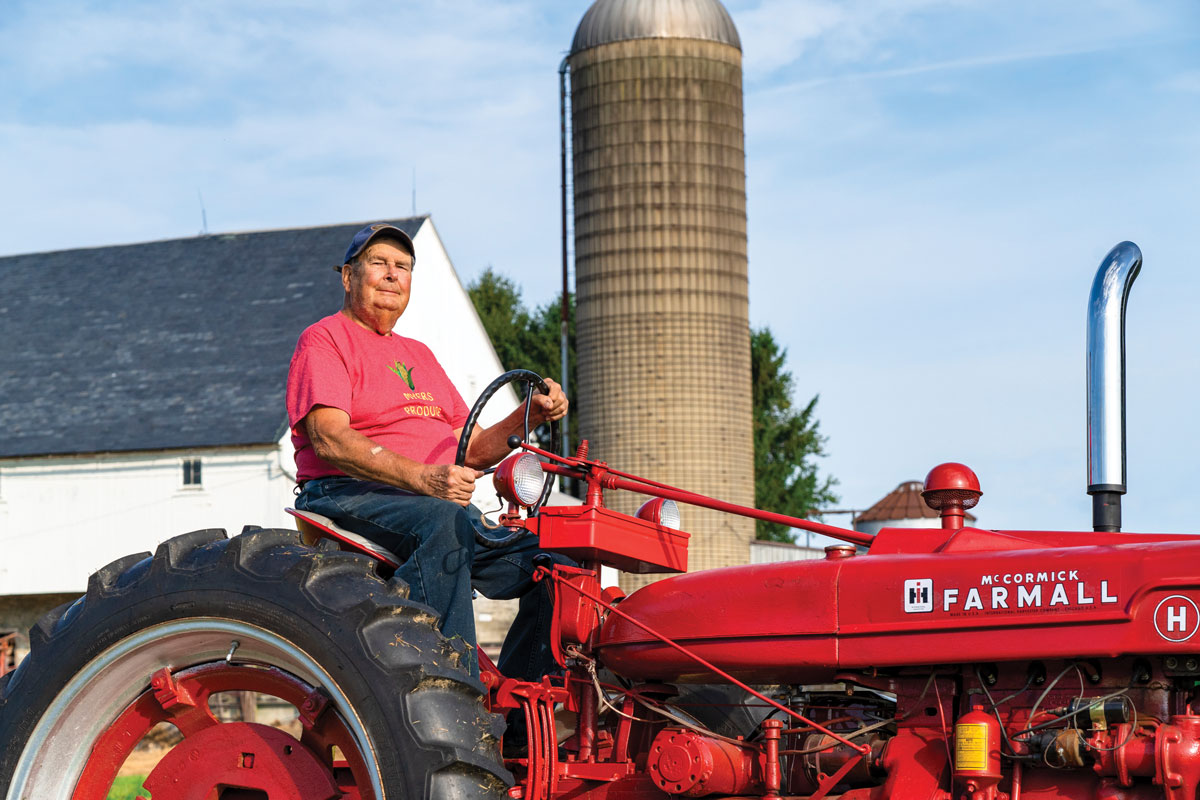
Now 84 years of age, Frank still works the farm. He’s aboard a tractor that dates to the ‘50s and was restored by his grandson, Brad.
As for farming, in 2000 he predicted the industry would see a raft of changes in the future, and they would occur “at an even faster rate thanks to improving technology.” Changes did come to the Myers farm. Because vegetable farming is so hands-on, the Myers changed their focus and now concentrate on growing alfalfa, barley and corn on 41% of the 214 acres that are tillable. (Tillable acres are also leased to other farmers.) They closed the produce stand six years ago. “We lost our help,” Frank says of his grandchildren and their friends who worked at the stand.
The Myers also have no choice but to pay attention to the global climate and tariff situations. “It’s been a tough year for farmers,” he says of tariffs. “China has stopped buying corn and soybeans. It’s really affecting the farmers in the Midwest – for them, it’s a double whammy” because of the bad weather that delayed spring planting. “We’re assuming it’s a temporary situation,” he says in a hopeful tone.
The family is taking steps to ensure that a ninth generation of Myers will have the opportunity to grow up on the farm. The farm is enrolled in the Clean & Green Program, a preferential tax assessment for land that is devoted to agriculture, open space or forestry. Such land is taxed based upon its use value rather than its fair market value. “It’s the only way we can afford to live here,” Frank states. His children have returned to their careers – John works for the U.S. Postal Service, Margie does accounting work and Mark is a civil engineer.
They are also working on a farm succession plan. Currently, Frank and the Maisels share the farmhouse on the main farm, while Mark, Jane and Karen live in a smaller farmhouse that’s just a short walk away. John and Sue continue to live in the farmhouse that is located farther down Long Lane. Bradley and his family live in what was once a tenant house, as does Anna and her family. David lives on the farm, as well.
Frank is pinning his hopes on Bradley to eventually take over the farm, noting that he is especially interested in the grass-fed cattle movement. His interests also lie in conservation methods, and he restored the tractor that dates to the ‘50s and, according to Margie, “shows up in a lot of wedding pictures.”
The succession plan also calls for dissolving the family partnership and subdividing the farm into four quadrants, which will shift to private ownership. The plan will make it more feasible for Frank’s grandchildren and future generations of Myers to live on the land as well as farm it, but on a much smaller scale.
Labor Day weekend was special for the Myers family. It was the first time they were together since Katie’s June 2018 wedding, which was held on the farm. A new generation had expanded the family tree – Brad’s son, Hudson, is nearly 6 months old, and Anna was nearing her due date. The only family member who couldn’t make it to the reunion in Lancaster was Matthew’s wife, Rachel, who was on duty at the hospital. Ben and Katie arrived from Pittsburgh, while John made the drive from Wilmington. “Hopefully, we’ll all be together for Ben and Tara’s wedding in Pittsburgh come November,” Frank says.





SHARE
PRINT